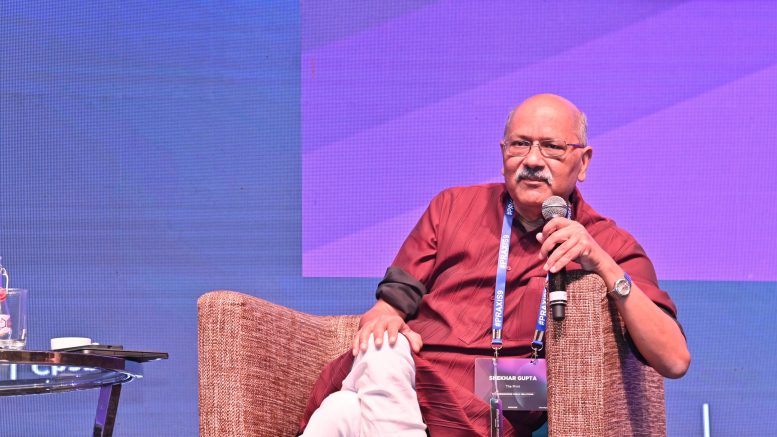It’s been a while we know that journalism is changing. Readership levels of newspapers are down and pretty much everyone gets the headlines on Twitter. Digital is the new normal and this pace of digital change has swept through journalism too. The English and language dailies that we were used to, are on the decline, as social media takes on a ‘news’ role. Of course, the pandemic played a role too in this.
However, this does not mean that people are no longer consuming news. What are the changes? Are there any new emerging forms of journalism that are allowing people to access news, across the world?
 Shekhar Gupta, Founder & Editor-in-Chief – The Print discussed “The Changing Face of Journalism” in a conversation with Chhavi Leekha, AVP, Corporate Communications & Brand Reputation – IndiGo.
Shekhar Gupta, Founder & Editor-in-Chief – The Print discussed “The Changing Face of Journalism” in a conversation with Chhavi Leekha, AVP, Corporate Communications & Brand Reputation – IndiGo.
Having avoided social media till date, Shekhar admitted social media is good and bad; mostly good, till you begin to enjoy the bad. “The worst aspect of social media is that it becomes a mob sensation. Social is now the new form of ‘Lok kya kahenge’” he declared. And does that impact the bias of what is reported, pondered Chhavi, to which he said that it’s an incredible force multiplier; it can spread the word quickly and it can also trivialise news and “these are things all of us have to navigate”.
News accuracy – top-of-mind
We know that news accuracy has always been top-of-mind for journalists. Good decision-making depends on people having reliable, accurate facts put in a meaningful context. And journalism does not pursue truth in a philosophical sense, but in a more down-to-earth manner. Real news is written by real journalists who adhere to a code of ethics for reporting. How do we deal with this accuracy? According to Shekhar, he sees this frustration all the time. Quoting the fact we are the only country in the world, where the government holds more than 10% share of a tobacco organisation. How much of questioning is there in the media about this?
Is there unbiased reporting in media? Are journalists supposed to be unbiased? To maintain objectivity in journalism, it was the rule for journalists to present the facts, whether or not they agree with those facts. Objective reporting is meant to portray issues and events in a neutral, unbiased manner, regardless of the writer’s opinion or personal beliefs. If there was no space for reporting then, why should 150 million come to us, he questioned; there is space for polarised journalism and as long as you know that, you can handle it.
Ethics in Journalism – what are the rules of the game?
What about ethics in journalism? Journalistic ethics are the common values that guide reporters. They lay out both the aspirations and obligations that journalists, editors, and others working in the field should follow, to execute their work responsibly. Ethical journalism strives to ensure the free exchange of information that is accurate, fair and thorough. Journalism ethics have evolved over time. Most news organisations have their own written codes of ethics. It is widely known that if a professional journalist or news organisation transgresses these ethical standards, they will lose credibility.
Evolving trail of journalism
And have we reached the stage where we will pay for news? “We are a country of freedom fighters, and we want everything free,” was his point of view.
Talking about data journalism, he said it is part of the evolution of journalism. Twenty years back it was a science bank, access-based and then access started to dry up. “Access is power now. And in today’s situation, data is power.” It’s a new skill, and therefore, we need more data journalists now, he explained.
Tracing his well known interview series, Walk the Talk, Chhavi enquired what has changed, and what is the lens through which he views journalism? Pat came his answer – you need to stay ‘curious’!
The views and opinions published here belong to the author and do not necessarily reflect the views and opinions of the publisher.






Be the first to comment on "PRAXIS2022: The Changing Face of Journalism"